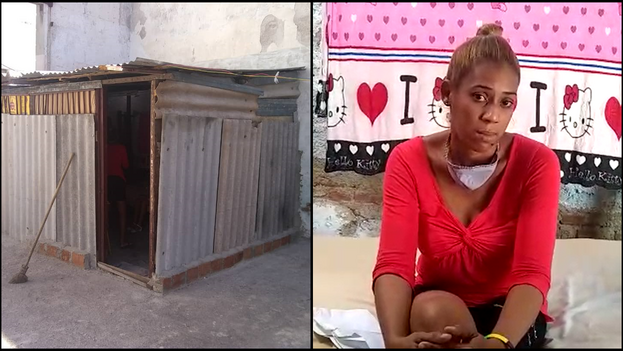
![]() 14ymedio, Francisco Herodes Díaz Echemendía, Santiago de Cuba, 16 February, 2021 — Yaneysi Dupuy Zamora had been sleeping in the living room of her grandmother’s house for 13 years with her 10-year-old daughter. Two months ago she decided, with the few materials she could find, to build a small house on land abandoned by the State on Bartolomé Masón Street (San Basilio), on the corner of Peralejo, in the center of Santiago de Cuba.
14ymedio, Francisco Herodes Díaz Echemendía, Santiago de Cuba, 16 February, 2021 — Yaneysi Dupuy Zamora had been sleeping in the living room of her grandmother’s house for 13 years with her 10-year-old daughter. Two months ago she decided, with the few materials she could find, to build a small house on land abandoned by the State on Bartolomé Masón Street (San Basilio), on the corner of Peralejo, in the center of Santiago de Cuba.
There, in a vacant lot without a roof that in the past was a building for state use but of which only the façade remains, other families settled down to build nine small houses with materials collected from the streets.
“This space was empty, there was almost nothing, only garbage and three recently built wooden houses. I approached one of the neighbors and asked her if I could build something of my own in a corner,” she tells 14ymedio. Dupuy, 38, had submitted several requests to get access to a state parcel, but never received a response.
A few days ago, they received a visit from the inspectors of the Physical Planning Institute to inform them that they could not stay in the premises and they were given a notice that the State would demolish the houses within 72 hours. “I don’t have a bathroom, I don’t have anything, but even so, in this little piece, when I close my door, I can even rest,” says Dupuy. “For more than a week I have been without peace.”
Cuban legislation considers an “illegal occupant” to be anyone who has built or occupies “a dwelling built on land that is known to be owned by another person who has not allowed said building, or on state land without any authorization.” Penalties include fines, home demolition, and eviction.
Shortly after the first visit, another inspector fined each family 500 pesos. “He did not look at the conditions in which I am living with a little girl, that I don’t even have money to eat and how I am going to pay a fine of 500 pesos. I cannot tear this down, because where am I going to sleep with my daughter?”
The inspector returned three days later and sanctioned them with another fine of 1,000 pesos and warned them that he would later give them another of 1,500. “I don’t even know his name because he didn’t even have his identification,” says Dupuy, “but he threatened me in front of my daughter: ’Too bad your tiles are very nice because we’re going to destroy them’, that’s what he told me.” To which she replied: “Well, you will demolish it with me inside. I will close the door of my little house with my girl inside.”
The illegal residents allege that the land was abandoned, turned into a garbage dump that they have been cleaning little by little, in the middle of a city with serious housing problems. “This was immoral, while there are so many homeless people in Santiago,” another of the occupants of the vacant lot told 14ymedio .
Previously, the place was a large warehouse linked to private commerce that was nationalized in the 1960s. In 2012 the winds of Hurricane Sandy demolished the roof of the property and, after a few years, kiosks were placed inside it for the sale of beer and soda in bulk. Thus, it came to be filled with waste to the annoyance of the residents of the area who complained of rats and bad smells.
“Do you think this has the optimal conditions for a human being to live? No,” says Dupuy, who is a professor at the Provincial School of Arts. “Only those who need it, and yet we try to live because we have nowhere.”
“Do you think this has the optimal conditions for a human being to live? No,” says Dupuy, who is a teacher at the Provincial School of Arts. “Only those who need it, and yet we try to live because we have nowhere.”
According to official data, the housing deficit in Cuba reached 929,695 houses last year. Among the most affected provinces are Havana, with a shortage of 185,348 homes; Holguín, with 115,965, and Santiago de Cuba, with 101,202.
____________
COLLABORATE WITH OUR WORK: The 14ymedio team is committed to practicing serious journalism that reflects Cuba’s reality in all its depth. Thank you for joining us on this long journey. We invite you to continue supporting us by becoming a member of 14ymedio now. Together we can continue transforming journalism in Cuba.
